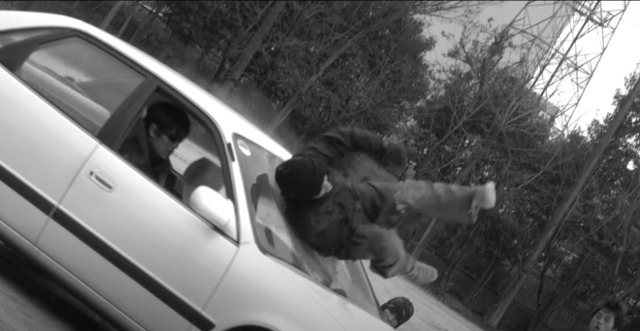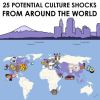
Kids are still in for a memorable lesson though.
On 2 December, a group of students and residents gathered at a junior high school in the town of Mibu in Tochigi Prefecture. The purpose was to watch several demonstrations of cars and trucks colliding with stunt performers riding bicycles to illustrate the dangers of traffic accidents.
Scenarios include a bike colliding with an open car door and getting pulled under a truck that turned left while the bike was in its blind spot. In most cases, the stunt performer dramatically rolls along the ground or across the hood of a car badly dented from repeated impacts.
▼ A news report from the show in Mibu
These types of demonstrations take place all over Japan and are known as “Scared Straight” in that it’s intended to frighten children into observing traffic safety. The name comes from the 1978 Oscar-winning documentary in which a group of juvenile delinquents are both berated and encouraged by lifers at Rahway State Prison to stop them from making the same bad life choices.
▼ A clip from Scared Straight
The success of the film spawned a series of similar Scared Straight programs in prisons across the U.S., though their effectiveness has long been a subject of debate. Nevertheless, their core concept of using fear as a teaching tool eventually made its way to Japan, but with some significant changes.
In 1992, a stuntman held a traffic safety seminar at Itabashi Police Station in Tokyo which is believed to have been the start of these demonstration shows. It’s unclear at what point the “scared straight” label was applied to this, but around 2010 when kids riding bikes while gazing at their smartphones became a big problem, Scared Straight shows really started to take off.
▼ Several companies specialize in scared straight such as Worsal
The one similarity that remains with the American Scared Straight programs is that the effectiveness is uncertain. At first glance, it might seem that watching a trained professional bounce off the hood of a car is more impressive than scary, but that may also have the benefit of getting kids’ undivided attention compared to conventional traffic safety programs.
According to a lot of the comments to the many scared straight videos online, these demonstrations do seem to make an impact.
“When they did it at my school, the stuntman pretended to be dead.”
“That’s a great way to teach. Those stunt people are amazing.”
“They’re going to hurt one of these days. They should stop it.”
“After watching one of these I went to check actual drive recorder footage online. That made me want to think a lot more seriously about my driving.”
“I saw one the other day and it really made me scared of the reality of accidents.”
The Journal of Japan Society of Engineers published a case study in 2016 that looked at how well the lessons learned at Scared Straight demonstrations stuck with junior high students. Through surveys conducted before, immediately after, and one month after both Scared Straight and conventional traffic safety programs, they found that the general effects immediately after and one month after were about the same for each. However, students who watched a Scared Straight demonstration specifically held onto a sense of dangerous situations slightly better after one month than other kids.
▼ The Scared Straight class held by Kyoto City goes pretty hard at times
So, in the end, Scared Safe, Japanese style, works as well as any traffic safety program, if not slightly better, so it’s just a matter of cost-effectiveness for schools and local communities who choose that route. They’re still relatively new as well, and with some development, these companies may find even more potent ways to keep kids safe.
Source: YouTube/とちテレNEWS, J-Stage, Kotobank, Worsal
Top image: YouTube/CityOfKyoto
● Want to hear about SoraNews24’s latest articles as soon as they’re published? Follow us on Facebook and Twitter!

 “25 Potential Culture Shocks from around the World” infographic offers tidbits of travel wisdom
“25 Potential Culture Shocks from around the World” infographic offers tidbits of travel wisdom Survey finds that one in five high schoolers don’t know who music legend Masaharu Fukuyama is
Survey finds that one in five high schoolers don’t know who music legend Masaharu Fukuyama is Highest Starbucks in Japan set to open this spring in the Tokyo sky
Highest Starbucks in Japan set to open this spring in the Tokyo sky Family Mart’s Shibuya Cat Street shop hosts first-ever rescue cat photo exhibition for Cat Day
Family Mart’s Shibuya Cat Street shop hosts first-ever rescue cat photo exhibition for Cat Day Starbucks Japan complexly raises prices, will now charge for takeout bags
Starbucks Japan complexly raises prices, will now charge for takeout bags “25 Potential Culture Shocks from around the World” infographic offers tidbits of travel wisdom
“25 Potential Culture Shocks from around the World” infographic offers tidbits of travel wisdom Survey finds that one in five high schoolers don’t know who music legend Masaharu Fukuyama is
Survey finds that one in five high schoolers don’t know who music legend Masaharu Fukuyama is Highest Starbucks in Japan set to open this spring in the Tokyo sky
Highest Starbucks in Japan set to open this spring in the Tokyo sky Family Mart’s Shibuya Cat Street shop hosts first-ever rescue cat photo exhibition for Cat Day
Family Mart’s Shibuya Cat Street shop hosts first-ever rescue cat photo exhibition for Cat Day Starbucks Japan complexly raises prices, will now charge for takeout bags
Starbucks Japan complexly raises prices, will now charge for takeout bags Giant Clodsire Pokémon plushie comes with up to 32 Woopers in super size, super cute set【Pics】
Giant Clodsire Pokémon plushie comes with up to 32 Woopers in super size, super cute set【Pics】 Osaka establishes first designated smoking area in Dotonbori canal district to fight “overtourism”
Osaka establishes first designated smoking area in Dotonbori canal district to fight “overtourism” Saitama is home to the best strawberries in Japan that you’ve probably never even heard of
Saitama is home to the best strawberries in Japan that you’ve probably never even heard of Street Fighter cafe now open in Tokyo for fans hyped and hungry for SF6 launch/lunches
Street Fighter cafe now open in Tokyo for fans hyped and hungry for SF6 launch/lunches Starbucks Japan unveils new Sakura Frappuccino for cherry blossom season 2025
Starbucks Japan unveils new Sakura Frappuccino for cherry blossom season 2025 The 10 most annoying things foreign tourists do on Japanese trains, according to locals
The 10 most annoying things foreign tourists do on Japanese trains, according to locals Starbucks Japan releases new sakura goods and drinkware for cherry blossom season 2026
Starbucks Japan releases new sakura goods and drinkware for cherry blossom season 2026 Naruto and Converse team up for new line of shinobi sneakers[Photos]
Naruto and Converse team up for new line of shinobi sneakers[Photos] Is Sapporio’s Snow Festival awesome enough to be worth visiting even if you hate the snow? [Pics]
Is Sapporio’s Snow Festival awesome enough to be worth visiting even if you hate the snow? [Pics] Japan has trams that say “sorry” while they ride around town…but why?
Japan has trams that say “sorry” while they ride around town…but why? Tokyo Skytree turns pink for the cherry blossom season
Tokyo Skytree turns pink for the cherry blossom season Sakura Totoro is here to get spring started early with adorable pouches and plushies
Sakura Totoro is here to get spring started early with adorable pouches and plushies Poop is in full bloom at the Unko Museums for cherry blossom season
Poop is in full bloom at the Unko Museums for cherry blossom season Shibuya Station’s Hachiko Gate and Yamanote Line stairway locations change next month
Shibuya Station’s Hachiko Gate and Yamanote Line stairway locations change next month Japan’s new “Cunte” contact lenses aren’t pronounced like you’re probably thinking they are
Japan’s new “Cunte” contact lenses aren’t pronounced like you’re probably thinking they are Japan’s newest Shinkansen has no seats…or passengers [Video]
Japan’s newest Shinkansen has no seats…or passengers [Video] Foreigners accounting for over 80 percent of off-course skiers needing rescue in Japan’s Hokkaido
Foreigners accounting for over 80 percent of off-course skiers needing rescue in Japan’s Hokkaido Super-salty pizza sends six kids to the hospital in Japan, linguistics blamed
Super-salty pizza sends six kids to the hospital in Japan, linguistics blamed Starbucks Japan unveils new sakura Frappuccino for cherry blossom season 2026
Starbucks Japan unveils new sakura Frappuccino for cherry blossom season 2026 Foreign tourists in Japan will get free Shinkansen tickets to promote regional tourism
Foreign tourists in Japan will get free Shinkansen tickets to promote regional tourism Take a trip to Japan’s Dododo Land, the most irritating place on Earth
Take a trip to Japan’s Dododo Land, the most irritating place on Earth Is China’s don’t-go-to-Japan warning affecting the lines at a popular Tokyo gyukatsu restaurant?
Is China’s don’t-go-to-Japan warning affecting the lines at a popular Tokyo gyukatsu restaurant? Survey asks foreign tourists what bothered them in Japan, more than half gave same answer
Survey asks foreign tourists what bothered them in Japan, more than half gave same answer Japan’s human washing machines will go on sale to general public, demos to be held in Tokyo
Japan’s human washing machines will go on sale to general public, demos to be held in Tokyo Starbucks Japan releases new drinkware and goods for Valentine’s Day
Starbucks Japan releases new drinkware and goods for Valentine’s Day We deeply regret going into this tunnel on our walk in the mountains of Japan
We deeply regret going into this tunnel on our walk in the mountains of Japan Studio Ghibli releases Kodama forest spirits from Princess Mononoke to light up your home
Studio Ghibli releases Kodama forest spirits from Princess Mononoke to light up your home Major Japanese hotel chain says reservations via overseas booking sites may not be valid
Major Japanese hotel chain says reservations via overseas booking sites may not be valid Put sesame oil in your coffee? Japanese maker says it’s the best way to start your day【Taste test】
Put sesame oil in your coffee? Japanese maker says it’s the best way to start your day【Taste test】 No more using real katana for tourism activities, Japan’s National Police Agency says
No more using real katana for tourism activities, Japan’s National Police Agency says Giant Clodsire Pokémon plushie comes with up to 32 Woopers in super size, super cute set【Pics】
Giant Clodsire Pokémon plushie comes with up to 32 Woopers in super size, super cute set【Pics】 Osaka establishes first designated smoking area in Dotonbori canal district to fight “overtourism”
Osaka establishes first designated smoking area in Dotonbori canal district to fight “overtourism” Saitama is home to the best strawberries in Japan that you’ve probably never even heard of
Saitama is home to the best strawberries in Japan that you’ve probably never even heard of Street Fighter cafe now open in Tokyo for fans hyped and hungry for SF6 launch/lunches
Street Fighter cafe now open in Tokyo for fans hyped and hungry for SF6 launch/lunches Starbucks Japan unveils new Sakura Frappuccino for cherry blossom season 2025
Starbucks Japan unveils new Sakura Frappuccino for cherry blossom season 2025 Shimane has a secret hot spring town that feels like stepping into an old Japanese film
Shimane has a secret hot spring town that feels like stepping into an old Japanese film Shibuya Station’s Hachiko Gate and Yamanote Line stairway locations change next month
Shibuya Station’s Hachiko Gate and Yamanote Line stairway locations change next month The most expensive fish sausage we could find in Tokyo divides our opinions, empties our wallet
The most expensive fish sausage we could find in Tokyo divides our opinions, empties our wallet RocketKitchen makes a giant Hi-Chew candy from over 1,400 Hi-Chew pieces!
RocketKitchen makes a giant Hi-Chew candy from over 1,400 Hi-Chew pieces! Plain, protein, and yakisoba…there’s a takoyaki for all at this specialty shop in Tokyo
Plain, protein, and yakisoba…there’s a takoyaki for all at this specialty shop in Tokyo Top 100 manga of all time chosen by survey of 150,000 Japanese people
Top 100 manga of all time chosen by survey of 150,000 Japanese people J-pop mega star Ado reveals she’s been living in the U.S., may not understand language acquisition
J-pop mega star Ado reveals she’s been living in the U.S., may not understand language acquisition Secret tourist stop in Japan has a lift car that whisks you away to a mystery mountain destination
Secret tourist stop in Japan has a lift car that whisks you away to a mystery mountain destination